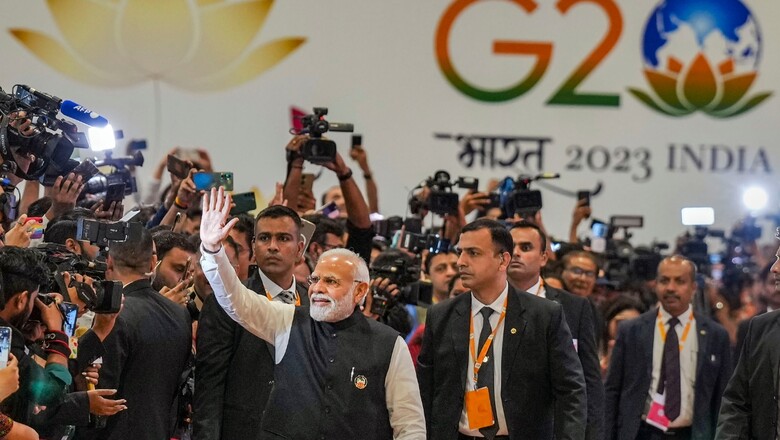
views
The year 2023 saw significant bilateral or multilateral summit meetings involving India. This gave opportunities to strengthen India’s ties with major countries, as also play a constructive role in multilateral forums with its strong advocacy of dialogue and diplomacy to address differences at the international level. India’s voice was heard with attention and respect as it is now backed by strong leadership, economic growth, and an ambition to play a greater role in international governance. Its attachment to strategic autonomy has widened its diplomatic options, as it can balance its interests better. India as a bridge between the North and the South, and between democracies and so-called autocracies is seen as a valued partner, even when there is disagreement over some aspects of its foreign policy.
The success of India’s summit season was highlighted the most by the success of its G20 presidency. The G20 summit was held in very challenging circumstances. The Ukraine conflict, although an issue of European security in essence, was impacting the rest of the world, especially the Global South, with disruptions in food, fertiliser and energy supplies as a result of draconian sanctions imposed on Russia by the US and its allies, who since the start of the conflict had shown a determination to push for a condemnation of Russia in all forums, including in the UN.
The risk was, therefore, real that the G20 summit could fail to issue a Summit Declaration, much to the discomfiture of India which had put in tremendous national effort to leverage the summit to showcase a new and dynamically rising India, if the G7 insisted on condemning Russia and the hardened position of Russia and China after the Bali summit led to an inevitable impasse. The absence of both Presidents Putin and Xi from the summit complicated the scope for diplomacy in bridging differences at the highest level. In the event, India through hyperactive diplomacy, succeeded in forging a declaration with full consensus, without any footnotes.
Undoubtedly, the US and the G7 for larger geopolitical reasons to preserve the G20 as a multilateral forum of G7 and the Global South, and keeping also in view the need to not break the momentum of expanding India-US partnership which would have been an inevitable consequence if a summit held with such fanfare by India failed at the end, chose to settle for a text that does not even mention Russia by name. Russia, too, keeping its relations with India in mind, also showed flexibility in agreeing to generalised formulations that the G7 could sell as directed at Russia’s military intervention in Ukraine. President Putin praised India for depoliticising the G20.
India strengthened its diplomatic weight in advance of the G20 summit by organising the Voice of the Global South Summit, attended by 125 countries. The clear aim was to durably shape the G 20 agenda in favour of the concerns and expectations of the developing countries on a range of issues, be it those of managing global debt vulnerabilities, food and energy security, eliminating hunger, climate change financing, affordable, just and sustainable green development, focus on SDGs, reforming international financial institutions, and so on.
India pushed successfully for the inclusion of the African Union as a G20 member so that the voice of the Global South in G20 became stronger. This initiative also helped to balance the EU’s separate membership of the G20.
In 2023, India under Prime Minister Modi continued to influence the international discourse with many of its civilisation values, political priorities and ideas, as well as economic achievements. The G20 motto of ‘Vasudhaiva Kutumbakam’ is a striking example of internationalising a core idea of Indian humanism. Calling for a human centric global system, propagating the idea of LiFE for sustainable development, research on climate resilient grains, Global Initiative for Global Health, our success in developing Digital Public Infrastructure (DPI), One Future Alliance to implement DPI, are some other instances of India introducing its ideas into the international system hitherto dominated by G7 priorities.
Prime Minister Modi’s State visit to the US in June 2023 was remarkably successful. The invitation to Modi showed that the US chose to adopt a more pragmatic position on our relations with Russia. The massive spurt in our oil purchases from Russia at discounted prices has been an irritant but India has emphatically stood its ground in its national interest.
In the US geopolitical calculus, with the challenge from China in mind, India’s value as a partner has grown. The US and China are re-engaging each other as demonstrated by the Biden-XI meeting in San Francisco, but the rivalry between the two countries for global leadership has intensified, especially in the technology domain, even if the US wants to put guard rails to avoid a direct military conflict over Taiwan. The US has now become India’s biggest technology partner. During the visit the US National Security Adviser Jake Sullivan jointly chaired a meeting with his Indian counterpart Ajit Doval to launch the ICET (Initiative on Critical and Emerging Technologies) in Washington DC was unprecedented. The ICET would open doors to India-US cooperation in areas that would be key to India’s own technological progress.
During the year it was decided to start negotiations on Security of Supply Arrangement (SSA) and Reciprocal Defence Procurement Agreement (RDPA) as part of efforts to fast track technology cooperation and co-production in air combat and land mobility systems, intelligence sharing, surveillance and reconnaissance, especially in the underwater domain, as well as industry to industry cooperation. In May 2023 India and the US held the Inaugural India-US Advanced Domains Defence Dialogue to strengthen partnership in new defence domains, with emphasis on space and artificial intelligence. A new initiative has been launched — the India-US Defence Acceleration Ecosystem (INDUS-X) to advance cutting edge technology cooperation. That US has given clearance to General Electric Company to develop in cooperation with India the GE F414-INS6 jet engine for India’s Tejas Mk II Light Combat Aircraft and AMCA Mk I, which is vital for India’s aatmanirbhar ambitions to develop indigenous defence manufacturing.
President Macron invited Prime Minister Modi to be chief guest at Bastille Day on July 14 this year and decorated him with the Grand Cross of the Legion of Honour, the highest French honour. Modi’s visit was an occasion to lay the foundations of a longer-term strategic relationship spanning the next 25 years, for which the two countries adopted the “Horizon 2047 Roadmap on the 25th Anniversary of the Indo-French Strategic Partnership: Towards a Century of French-Indian Relations”. Modi and Macron noted that the partnership had already become one of regional responsibilities and global importance, with a common quest for a stable multipolar world, and with the defence and security partnership extending from seabed to space, with digital, innovation and startup partnership as new areas of growth.
India-France defence partnership took a major step forward with India’s decision to purchase 26 Rafales (naval version) for its new aircraft carrier and to construct three additional Scorpene submarines in India. The joint statement issued on the occasion recognised that France is one of India’s key partners in the development of a self-reliant defence industrial and technological base. India and France adopted a new Indo-Pacific Roadmap during Modi’s visit, which includes extending their cooperation to the Pacific. To mark the closeness of India-France ties, President Macron will be the Chief Guest at India’s R-Day in 2024.
In July 2023 India successfully chaired the SCO summit despite many diplomatic challenges as relations between SCO member states have their quota of bilateral difficulties and tensions. To what extent these can be set aside or bridging formulations found so that broad understandings are reached on regional and international issues in common interest is a challenge that India as Chair of the SCO had to address.
The New Delhi Declaration rightly acknowledged that the world was undergoing unprecedented transformations which required an increase in the effectiveness of global institutions, stronger multi-polarity, increased interconnectedness, interdependence, and an accelerated pace of digitisation. It expressly confirmed the commitment of member states to building a more representative, democratic, just and multipolar world order based on international law, multilateralism, equal, joint, indivisible, comprehensive and sustainable security, cultural and civilisational diversity, with a central coordinating role of the UN.
The Declaration rightly stressed that unilateral application of economic sanctions other than those approved by the UN Security Council were incompatible with the principles of international law and had a negative impact on the third countries and international economic relations. Much of this is a critique of the West dominated global system.
In May 2023, Prime Minister Modi, invited to the G7 summit, also attended the Quad summit in Japan. India’s commitment to Quad has become more explicit, despite criticism by both China and Russia that the US was pursuing bloc politics in Asia. With China’s openly aggressive behaviour towards New Delhi, the security content of the Quad for India has become increasingly significant. India has, nevertheless, pursued with success its key objective of anchoring Quad into a broader and durable cooperative framework that it could also leverage for promoting its own economic interests.
At the Quad summit at Hiroshima both these elements- economic and security- were reflected in PM Modi’s opening statement in which he talks of the Quad establishing itself as an important platform for ensuring peace, stability and prosperity in the Indo-Pacific, recognising that the security and success of the Indo-Pacific is important also to the world, and that the region is the engine of global trade, innovation and growth. He noted the growing cooperation in areas like climate action, disaster management, strategic technologies, reliable supply chains, health security, maritime security and counter-terrorism. India now sees Quad as a “global good”, as reiterated by PM Modi in his remarks.
At Hiroshima, India joined the vigorous criticism of China’s policies in the western Pacific that adversely affected India’s interests too. At the bilateral level, while talks at the military and diplomatic levels have continued, no breakthrough has occurred which could have helped to open the doors to a Modi-Xi summit talks in 2023. Apart from a cursory exchange at Bali during the G 20 summit between the two leaders, the relationship at the political level remains frozen, with India reiterating several times in 2023 that for the relations to be normal, the situation on the border has to become normal. President Xi did not attend the G 20 summit in New Delhi. The meeting of India’s Foreign Minister with his Chinese counterpart in New Delhi during the SCO Foreign Ministers’ meet produced no change in positions.
In August 2023, India participated in the BRICS summit in Johannesburg in South Africa. The expansion of BRICS was a major outcome of the summit. The number of countries from the Global South that formally applied for BRICS membership or showed interest in joining the grouping reflected a growing discontent with the West-dominated global order that continues to be shaped in accordance with the policy priorities and interests of the major Western powers.
The expansion of BRICS seems to have been based less on any well-defined criteria that India preferred and more on reaching a quick consensus on which countries from the 23 which had applied for membership would be acceptable to all the five existing members. Four of the six new members are from the same broad region: Saudi Arabia, UAE, Iran and Egypt, which shows the lopsided nature of the expansion.
India eventually supported the BRICS expansion. India has friendly ties with all the new members. With five of the new six members India has a strategic partnership. The leaders of five of the six countries have been chief guests at our Republic Day celebrations. With Ethiopia our relations have been traditionally strong. In Africa, Ethiopia is the largest recipient of long-term concessional credit from India.
A missing summit at the bilateral level in 2023 was with Russia. The last summit, the 21st, was held in December 2021. India has, however, ensured that its ties with Russia are not disrupted by the conflict in Ukraine and the G7 attempt to punish and isolate Russia. President Putin has publicly saluted India and Prime Minister Modi for unflinchingly pursuing the country’s national interest despite pressures.
Kanwal Sibal is a former Indian Foreign Secretary. He was India’s Ambassador to Turkey, Egypt, France and Russia. Views expressed in the above piece are personal and solely that of the author. They do not necessarily reflect News18’s views.



















Comments
0 comment